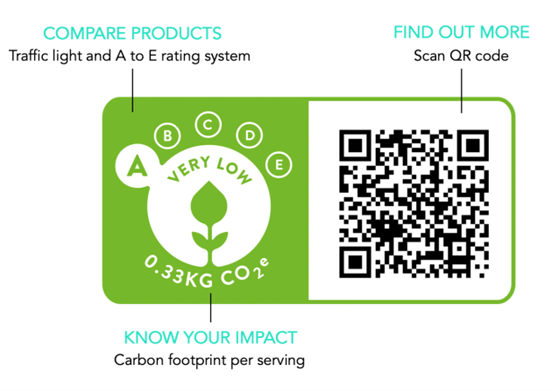
- The Green Claims Code is a government document that outlines the main principles that need to be followed for a company to make an environmental claim about any aspect of their business.
- The principles fall under two main themes: transparency and evidence. Any claims made must be truthful, unambiguous, meaningful, accurate, and substantiated with hard data that considers the full life cycle of the product or service in question.
- The holistic process that Reewild offers means your business can become Green Claims Code compliant. With complete eco-labels and bespoke life cycle assessments, your business will adhere to all of the Code’s principles.
- Companies like Tesco, Oatly, and Deutsche Bank have all made misleading claims in the past, and have been stuck with fines to pay. Customers are holding brands to a higher accountability than ever before. By implementing transparency into your company values, your business can become one of the most trusted brands on the market.
The Green Claims Code (GCC) was introduced by the Competition and Markets Authority (CMA) in September 2021. Businesses must comply with the Code if they are to make an environmental claim about products, services or processes. As consumer attitude shift, it is now the responsibility of businesses to be thorough and transparent about their impact, so the public has clarity on the sustainability of different products. The CMA recently found that up to 40% of green claims made online could be considered misleading.
What are environmental claims?
-8erkj.jpg)
Environmental claims are ones that create the impression that a product:
- Has a positive environmental impact or no impact on the environment
- Is less damaging to the environment than a previous version of the same good or service
- Is less damaging to the environment than competing goods or services.
Environmental claims may focus on the general impact a product has on the environment, or on specific environmental aspects such as the air, water or soil. Claims can be explicit or implicit. They can appear in advertisements, marketing material, branding (including business and trading names), on packaging or in other information provided to consumers.
The Green Claims Code main principles

- Claims must be truthful and accurate
- Claims must be clear and unambiguous
- Claims must not omit or hide important relevant information
- Comparisons must be fair and meaningful
- Claims must consider the full life cycle of the product or service
- Claims must be substantiated
What needs to be done by businesses
The GCC’s principles fall under two main themes: transparency and evidence. The CMA wants brands to be open and honest, whilst also having the data or evidence available to back up any claims.
- Being transparent means that consumers can see the true environmental impact of your product, whether that is through eco-labels on products, or within a sustainability section on the business website. This prevents brands from misleading consumers, as the public with unambiguous information.
- Evidence is the foundation for any green claims. To be transparent, businesses must first have collected environmental data about their processes. Any claims have to be substantiated with as much data as possible, otherwise they cannot be considered legitimate. Conducting a full Life Cycle Assessment covers all bases for businesses. It allows any claims made to have quantified, robust support.
How Reewild can make your business Green Claims Code compliant
The holistic process that Reewild offers means that your business would be compliant with all six of the main principles of the GCC. You can become climate transparent, and have the necessary data to back up your claims.
We offer the option for complete eco-labels with carbon scores and QR codes, so the consumer has access to all of the environmental information of a product with one quick scan.

Using our trusted calculator, we can provide you with accurate carbon scores that give you detailed information on the entire life cycle of your product’s supply chain, from farm to fork. This gives you the freedom to make substantial and legitimate environmental claims about your range.
Furthermore, we can work with you to carry out targeted, in-depth pieces of analysis and bespoke LCAs to give you the tools to make direct comparisons with competitors or different industries (eg. differing types of agriculture; plant-based vs meat, etc).
With Reewild, you can become GCC compliant and avoid falling foul of the CMA’s guidance. The future of the food industry is climate transparency. Join the movement today!
Examples of misleading environmental claims
- In June 2022, Tesco was found to have breached the GCC. They claimed that the Plant Chef (Tesco’s own brand of plant-based food) products being advertised were better for the environment than their meat-based equivalents. While the claim may well have been true, Tesco had no empirical evidence to back up the claim. They had not carried out a bespoke LCA to be able to make the explicit comparison between their own product and its meat-based equivalents.
- Oatly have been under fire for misleading consumers several times. Most recently, they have been criticised for stating: “climate experts say cutting dairy and meat products from our diets is the single biggest lifestyle change we can make to reduce our environmental impact.” In reality Oatly only consulted a single climate expert before including it in their campaign and amended the quote. Separately, Oatly claimed that the entire company generated “73% less CO2 vs milk, calculated from grower to grocer”. However, this claim was not peer-reviewed, and doesn’t apply to the brand’s entire range - just the direct comparison of the barista-edition oat milk to full fat cow’s milk.
-ldcz1.png)
- In December 2021, the nutritional drinks company Abnormal could not back up their claims that their products were ‘plastic free’. The advertising watchdog ruled the claim was misleading and unsubstantiated.
- The CMA is now ramping up its efforts to clamp down on misleading statements, and is currently reviewing environmental claims made by Asos, Boohoo and George at Asda. The in-depth investigations are particularly focusing on the exaggeration of positive impact and the omittance of important information. Boohoo have already come under fire for the use of vague language such as 'Ready for the Future' when referring to some clothing items.
Transparency is the new normal
Building transparency into the DNA of your company means that you are less likely to trip into public scrutiny further down the line. Your business will also benefit from increased trust and loyalty among consumers. Take Patagonia as an example, who are one of the most transparent brands worldwide. By owning up to their environmental impact, they have maintained an esteemed public image and loyal customer base. According to Forbes, over 90 percent of consumers say brand transparency is important to their purchase decisions. Now that the market holds such a huge range of choices and information, customers have greater expectations, and are holding brands to a higher level of accountability. Your business can be a part of the new normal, by implementing transparency into your company values today. Feel free to reach out to us at info@reewild.com.

